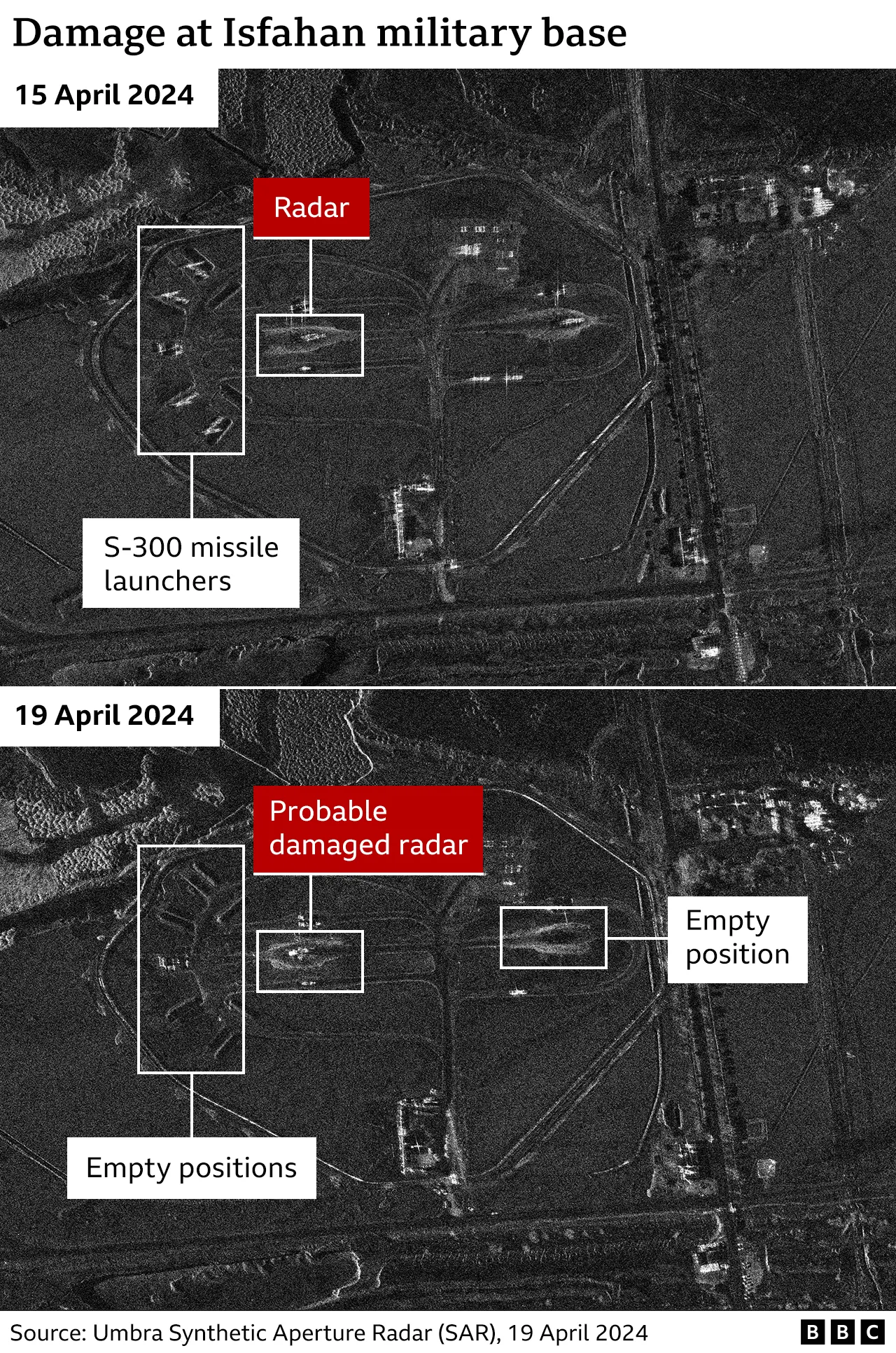Nothing to See Here, Folks
"Neither side is ready to jump over the brink.""Probably we're going to go back to the proxy war. [But now it's a proxy war with the risk of] that sudden eruption of state-to-state war.""Which we didn't have to worry about before."Alex Vatanka, director, Iran program, Middle East Institute Research Centre, Washington"The explosion this morning in the sky of Isfahan was related to the shooting of air defence systems at a suspicious object that did not cause any damage.""[Air defence batteries fired over reports of airborne drones, crews targeting several flying objects]."Iranian army commander Gen. Abdolrahim Mousavi"[Israel appears to have carried out the attack to] check off a box [by sending a message to Iran without doing anything too provocative that might upset the U.S. urging restraint or to spark any further retaliation from Iran].""It seems very limited, to send a message that 'we can strike you inside of Iran'."Yoel Guzansky, senior researcher, Institute for National Security Studies, Tel Aviv
 |
| An anti-Israel parade in Tehran on Friday The New York Times |
Neither
the sender of the message nor the message target appeared inclined to
linger on what appeared to be a restrained Israeli rebuke referencing
the 300 drones and Ballistic Missiles that Tehran sprinkled toward
Israeli airspace a week earlier. Message delivered. Message received. A
signal for Middle East political experts analyzing the interplay as both
enemies preparing to prevent the latest violent eruption from
ballooning into a full blown regional war.
"It
appears we're closer than ever to a broad regional war, despite the
fact that the international community will most likely make a great
effort to de-escalate tensions", commented Amos Harel, military-affairs commentator at the daily Haaretz
in Israel. The Islamic Republic of Iran has never made any secret of
its willingness to one day destroy Israel. Its furtive but obvious
nuclear program and focus on ballistic missile upgrades testament to
that oft-stated ambition.
 |
Nor
is it unknown that Iran is a major sponsor of proxy terrorist groups in
the Palestinian territories, Iraq, Lebanon, Yemen and Syria all of whom
have become involved in attacking Israel from its borders following the
Israel Defense Forces' incursion into Gaza with the express and
well-expressed purpose of destroying Hamas's operations and
extinguishing as many of its operatives as possible, to defang one of
the deadly serpents spawned from the Republic's IRGC al-Quds division.
Rising
tensions in the wake of the October 7 flood of terrorists representing
Hamas, Palestinian Islamic Jihad and the PLO backed by Iran that saw
their operatives, along with ordinary Palestinian civilians attack
Israeli border farming communities where their sadistic savagery gave
vent to the hatred for Jews consuming their venom-patterned minds by
committing unspeakable atrocities against Israeli civilians in an
organized, well-rehearsed orgy of rape, mutilation and mass murder.
When
Israel mounted its offensive in Gaza, Hezbollah saw it as an
opportunity to strike Israeli targets opening a second front in the
north of Israel, necessitating the evacuation of Israeli villages around
the Golan Heights. Iranian-backed Shiite militias in Iraq, Syria and
Yemen fired missiles and drones throughout the conflict in lethal,
distracting moves obviously meant to exhaust Israel's military reserves.
For
its part, Israel has, over time, conducted airborne raids by its
fighter jets in Syria, Lebanon and Iraq to destroy arms shipments from
Iran to its proxies, focusing mostly on Syria in an effort to dislodge
Iran from a planned permanent presence on Israel's border. On April1st
an airstrike killed two Iranian generals in the Syrian capital Damascus
at an Iranian diplomatic compound for which Iran named Israel as being
responsible -- vowing a response.
On
the 13th of April Iran calculated a first-time direct attack and
launched a rain of missiles and attack drones toward Israel, virtually
all of which were intercepted by an international coalition of
preventive partnership that included fighter planes and missile
interception by the United States, France, United Kingdom, Jordan, Saudi
Arabia and the UAE, working in tandem with the IDF, resulting in one
human casualty in Israel and a minimally affected Israeli airbase.
Israel's
response to Iran's attack arrived a week later with Iranian authorities
claiming their air defences fired at a major airbase near Isfahan, home
to Iran's F-14 Tomcats, an ageing fleet of American jets predating the
Islamic Revolution. Sites associated with Iran's nuclear program are
also established in the Isfahan area, including the underground Natanz
enrichment site, featuring in previous Israeli sabotage attacks. That
response by the IDF coincided with Iran's Supreme Leader Ayatollah Ali
Khamenei's 85th birthday.
Both
the UN's nuclear watchdog, the International Atomic Energy Agency and
Iranian State television declared all Iranian atomic sites in the areas
in question to be "fully safe"; "no damage" resulted. On the other hand,
it would seem that satellite imagery later revealed evidence of
probable damage at the Iranian air base following the Israeli strike. BBC Verify analyzed two images that showed part of an air-defence system at an airfield in Isfahan had been damaged.
 |
Labels: Iranian Attack on Israel, Iranian Proxies, Israeli Response on Isfahan, Middle East Chaos, October 7 Hamas Attack

<< Home